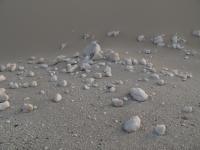 I can say, perhaps, that this trip has increased our awareness of the uncontrollable aspects of nature (the Icelandic volcano has now served notice to the oblivious) and revealed to us the existence of populations that are able to combine complex social organization and ownership of simple natural resources, which can only be the result of their deep knowledge of the territory.
I can say, perhaps, that this trip has increased our awareness of the uncontrollable aspects of nature (the Icelandic volcano has now served notice to the oblivious) and revealed to us the existence of populations that are able to combine complex social organization and ownership of simple natural resources, which can only be the result of their deep knowledge of the territory.
To read
22.09.2010 | by Cristina Salvador
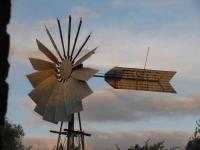 And I believe, having arrived at this point in life, that I can’t stop wanting to understand that the world, all over and not just here, conspires and produces utilizing always, or almost always, the use and abuse of others’ good faith. I’m afraid I will never be able, even oldish, to resign to this and become the subject well done, dissimulated, pirate, adaptable and finally adapted, that never, throughout my entire life, have I managed to be.
And I believe, having arrived at this point in life, that I can’t stop wanting to understand that the world, all over and not just here, conspires and produces utilizing always, or almost always, the use and abuse of others’ good faith. I’m afraid I will never be able, even oldish, to resign to this and become the subject well done, dissimulated, pirate, adaptable and finally adapted, that never, throughout my entire life, have I managed to be.
Ruy Duarte de Carvalho
31.08.2010 | by Ruy Duarte de Carvalho
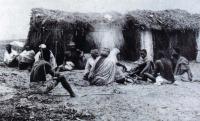 Can you imagine the Portuguese language at the centre of a learning-at-play exercise in the heart of Angola, where the main character, the protagonist, has no kind of academic training? It’s possible. In fact, in a tale told by the writer Uanhenga Xitu, it happens.
Can you imagine the Portuguese language at the centre of a learning-at-play exercise in the heart of Angola, where the main character, the protagonist, has no kind of academic training? It’s possible. In fact, in a tale told by the writer Uanhenga Xitu, it happens.
Face to face
18.08.2010 | by Luis Kandjimbo
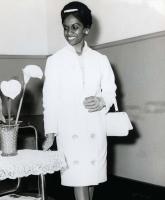 Her compositions were first known only in a small inner circle, but with the Luanda Song Festival, her work became known to a wider public. In the 60s she had formed a duo with the Portuguese journalist Adelino Tavares da Silva, who had just arrived in Angola. They composed four or five songs together and then registered in the Portuguese Writers’ Association, with Adelino as songwriter and Ana Maria as composer. It can be said that the duo revolutionised the Song Festival, when Maria Provocação was performed by Sara Chaves and Mulata é a Noite by Concha de Mascarenhas. They were both accompanied by Ngola Ritmos, the Angolan rhythm group.
Her compositions were first known only in a small inner circle, but with the Luanda Song Festival, her work became known to a wider public. In the 60s she had formed a duo with the Portuguese journalist Adelino Tavares da Silva, who had just arrived in Angola. They composed four or five songs together and then registered in the Portuguese Writers’ Association, with Adelino as songwriter and Ana Maria as composer. It can be said that the duo revolutionised the Song Festival, when Maria Provocação was performed by Sara Chaves and Mulata é a Noite by Concha de Mascarenhas. They were both accompanied by Ngola Ritmos, the Angolan rhythm group.
Stages
08.07.2010 | by Mário Rui Silva
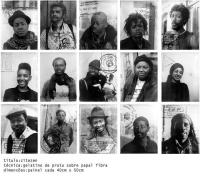 Délio Jasse work can be interpreted under the somewhat complex view of the post colonial speeches, in the sense that his images emanate a quality of alterity, which gives them identity. However this simplification can be limiting if it becomes dissonant with the artistic speech where his images belong, obviously.
Délio Jasse work can be interpreted under the somewhat complex view of the post colonial speeches, in the sense that his images emanate a quality of alterity, which gives them identity. However this simplification can be limiting if it becomes dissonant with the artistic speech where his images belong, obviously.
Face to face
08.07.2010 | by Hugo Dinis
 To western architects such as me, who have been developing their work as project designers or researchers in Angola, the issue that strikes us the most is the apparent conflict opposing Luanda to the rest of the Angolan territory.
To western architects such as me, who have been developing their work as project designers or researchers in Angola, the issue that strikes us the most is the apparent conflict opposing Luanda to the rest of the Angolan territory.
Ruy Duarte de Carvalho
12.04.2010 | by Cristina Salvador
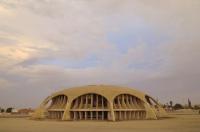 Kiluanji Kia Henda has displayed his art internationally – from Guangzhou to Cape Town, from Nairobi to Venice – which decouples his work from the exclusive legitimacy granted by Western contemporary art capitals. Another unique trait of his trajectory is that so far, his work has not been presented and sanctioned by the “small” world of its former “metropole”, Lisbon. As an Angolan artist, and therefore, from an independent country today and once a Portuguese colony, his art world’s has been extraneous to a set of cultural policies that take Portuguese-as-connection, and which rely on a closed circuit showcasing of art and its artists, traveling between ex-colonies and the ex-metropole.
Kiluanji Kia Henda has displayed his art internationally – from Guangzhou to Cape Town, from Nairobi to Venice – which decouples his work from the exclusive legitimacy granted by Western contemporary art capitals. Another unique trait of his trajectory is that so far, his work has not been presented and sanctioned by the “small” world of its former “metropole”, Lisbon. As an Angolan artist, and therefore, from an independent country today and once a Portuguese colony, his art world’s has been extraneous to a set of cultural policies that take Portuguese-as-connection, and which rely on a closed circuit showcasing of art and its artists, traveling between ex-colonies and the ex-metropole.
Face to face
12.04.2010 | by Marta Mestre
 I can say, perhaps, that this trip has increased our awareness of the uncontrollable aspects of nature (the Icelandic volcano has now served notice to the oblivious) and revealed to us the existence of populations that are able to combine complex social organization and ownership of simple natural resources, which can only be the result of their deep knowledge of the territory.
I can say, perhaps, that this trip has increased our awareness of the uncontrollable aspects of nature (the Icelandic volcano has now served notice to the oblivious) and revealed to us the existence of populations that are able to combine complex social organization and ownership of simple natural resources, which can only be the result of their deep knowledge of the territory.  And I believe, having arrived at this point in life, that I can’t stop wanting to understand that the world, all over and not just here, conspires and produces utilizing always, or almost always, the use and abuse of others’ good faith. I’m afraid I will never be able, even oldish, to resign to this and become the subject well done, dissimulated, pirate, adaptable and finally adapted, that never, throughout my entire life, have I managed to be.
And I believe, having arrived at this point in life, that I can’t stop wanting to understand that the world, all over and not just here, conspires and produces utilizing always, or almost always, the use and abuse of others’ good faith. I’m afraid I will never be able, even oldish, to resign to this and become the subject well done, dissimulated, pirate, adaptable and finally adapted, that never, throughout my entire life, have I managed to be.  Can you imagine the Portuguese language at the centre of a learning-at-play exercise in the heart of Angola, where the main character, the protagonist, has no kind of academic training? It’s possible. In fact, in a tale told by the writer Uanhenga Xitu, it happens.
Can you imagine the Portuguese language at the centre of a learning-at-play exercise in the heart of Angola, where the main character, the protagonist, has no kind of academic training? It’s possible. In fact, in a tale told by the writer Uanhenga Xitu, it happens.  Her compositions were first known only in a small inner circle, but with the Luanda Song Festival, her work became known to a wider public. In the 60s she had formed a duo with the Portuguese journalist Adelino Tavares da Silva, who had just arrived in Angola. They composed four or five songs together and then registered in the Portuguese Writers’ Association, with Adelino as songwriter and Ana Maria as composer. It can be said that the duo revolutionised the Song Festival, when Maria Provocação was performed by Sara Chaves and Mulata é a Noite by Concha de Mascarenhas. They were both accompanied by Ngola Ritmos, the Angolan rhythm group.
Her compositions were first known only in a small inner circle, but with the Luanda Song Festival, her work became known to a wider public. In the 60s she had formed a duo with the Portuguese journalist Adelino Tavares da Silva, who had just arrived in Angola. They composed four or five songs together and then registered in the Portuguese Writers’ Association, with Adelino as songwriter and Ana Maria as composer. It can be said that the duo revolutionised the Song Festival, when Maria Provocação was performed by Sara Chaves and Mulata é a Noite by Concha de Mascarenhas. They were both accompanied by Ngola Ritmos, the Angolan rhythm group.  Délio Jasse work can be interpreted under the somewhat complex view of the post colonial speeches, in the sense that his images emanate a quality of alterity, which gives them identity. However this simplification can be limiting if it becomes dissonant with the artistic speech where his images belong, obviously.
Délio Jasse work can be interpreted under the somewhat complex view of the post colonial speeches, in the sense that his images emanate a quality of alterity, which gives them identity. However this simplification can be limiting if it becomes dissonant with the artistic speech where his images belong, obviously.  To western architects such as me, who have been developing their work as project designers or researchers in Angola, the issue that strikes us the most is the apparent conflict opposing Luanda to the rest of the Angolan territory.
To western architects such as me, who have been developing their work as project designers or researchers in Angola, the issue that strikes us the most is the apparent conflict opposing Luanda to the rest of the Angolan territory.  Kiluanji Kia Henda has displayed his art internationally – from Guangzhou to Cape Town, from Nairobi to Venice – which decouples his work from the exclusive legitimacy granted by Western contemporary art capitals. Another unique trait of his trajectory is that so far, his work has not been presented and sanctioned by the “small” world of its former “metropole”, Lisbon. As an Angolan artist, and therefore, from an independent country today and once a Portuguese colony, his art world’s has been extraneous to a set of cultural policies that take Portuguese-as-connection, and which rely on a closed circuit showcasing of art and its artists, traveling between ex-colonies and the ex-metropole.
Kiluanji Kia Henda has displayed his art internationally – from Guangzhou to Cape Town, from Nairobi to Venice – which decouples his work from the exclusive legitimacy granted by Western contemporary art capitals. Another unique trait of his trajectory is that so far, his work has not been presented and sanctioned by the “small” world of its former “metropole”, Lisbon. As an Angolan artist, and therefore, from an independent country today and once a Portuguese colony, his art world’s has been extraneous to a set of cultural policies that take Portuguese-as-connection, and which rely on a closed circuit showcasing of art and its artists, traveling between ex-colonies and the ex-metropole. 